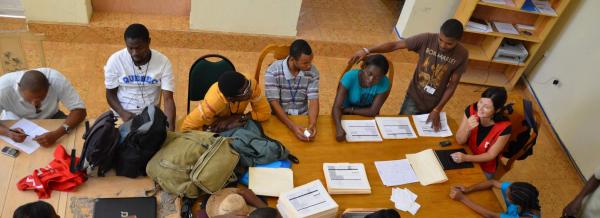Most of us have heard that Hawaii is this mystical place: people talk about the islands’ special energy, culture, and overall uniqueness. I had heard all of it before I set out on my adventure on the Big Island, but nothing could really prepare me for the vortex that is the Island of Hawai’i (which is one of its true names, according to the island's Indigenous people).
Nature and its spirits
I can only speak for myself, of course, but I felt like I landed in an alternative universe when I first set foot on this island. When people use adjectives like “intense,” “magical,” and “powerful,” I have to admit they describe exactly how I experienced the island.
The nature of Hawai’i is not meek and unimposing: it is so fiercely present, it wants all of your attention and every drop of reverence. The colours are rich with the deep blacks of the lava rock, the turquoise blue of the ocean, and the bright greens of the lush jungle, decorated with bursts of every hue you can imagine in the numerous flowers that spring from the trees and bushes.
My senses were overwhelmed because it wasn’t just the colours but also the smells and the sounds—you’re constantly surrounded by the coqui frogs’ songs, the splashing of the waves and the rustling of the wind; the sweet scents of the flowers, exotic fruit, and the salty breeze fill your nostrils wherever you go. So, even if you close your eyes, nature is still present, reaching deep into the core of your being.
As the earth is bubbling with hot lava deep under your feet, and the ocean is brimming with life all around you, you feel the two primal forces, water and fire clash against each other. And it does something to you and the people around you. Call me a romantic, but the island seems to challenge its inhabitants and visitors; temperaments collide and life lessons are being learned. Yes, I believe the island is doing this.
A few weeks into our stay at the Nature Retreat and Permaculture Learning Center Earthsong, its stewards were having a land blessing ceremony with a native Hawaiian practitioner, Leimana. I simply had to ask her a few questions about the island and its energies. What was that thing we were all feeling and couldn't quite put a finger on, I wondered?
A supernatural Power
It’s called mana, she explained—a supernatural power that is present on the island, where goddess Pele resides in her spiritual form of the sacred Lava. Leimana believes that the reason why the island feels so intense is because its nature is literally alive, with every leaf inhabited by the spirits of the land: the god-creators of the island as well as the ancestors, and all the spirit guardians. I asked Leimana how one could explain mana to people who don’t believe in anything beyond our physical reality. Her reply was: it could not be explained but experienced with respect, and an open mind and heart.
“Don’t complain,” Leimana’s kūpuna (grandparents) used to say to her whenever she was unhappy with the island’s temperamental weather, “for they are listening.” She gave that same advice to us, the temporary dwellers of Earthsong, who were unhappy with the rain and the wind: revere nature and don’t anger the spirits with your complaints.
One can be skeptical about this kind of approach, and again, I can only speak from my experience, which felt as if there was always something I was interacting with while on the island. And that “something” was tough on me, dragging out all my insecurities, doubts, and negativity from the depth of my soul into the light, exposing my shadow self, as Jung put it, and forcing me to face it.
Tread Lightly, Visitors. . .
I asked Leimana how to tread lightly on land like that. Even though her answer was on the mystical side, there was much practical wisdom in it.
“Why do you need to go to the volcano?” she asked. “What do you want with her?”
That question gave me pause: most tourists visit one of the volcanoes while on the island. Have any of us ever stopped and asked ourselves this question: what is my intention when I go anywhere? Is this place calling me or am I led by mere curiosity and the famous FoMO (fear of missing out)?
Leimana then explained that when visiting the volcano it was best to go with a local. One also had to ask for permission to enter and bring a gift. What does one give to the volcano?
“A lei,” she replied, “or a song, a prayer.”
And again, for the skeptics among us: taking a moment before entering a land or a place sacred to the locals anywhere in the world to take it in and ask for permission to enter, would give us a chance to stay present and alert and follow our intuition instead of mere curiosity.
Since our talk, I would pause and ask for permission every time before entering the waters or taking an unfamiliar path. I then heard other locals mention that ritual as well. Whether you believe in spirits of the land and mana or not, this approach will make you more mindful and present, and what’s the harm in that?
All in all, Leimana spoke with passion about her land and her ancestry, saying that our elders are a living treasure because of all the memory and wisdom of the past they hold; that the land is something to give care to and be grateful for. She concluded by saying that being a good Hawaiian meant giving care to the land and respecting the elders. I have to say this goes for being a good human as well.
Add this article to your reading list




